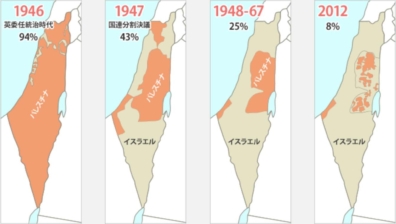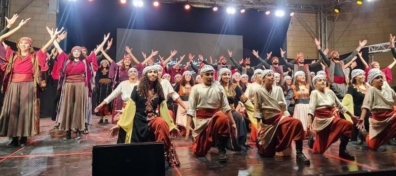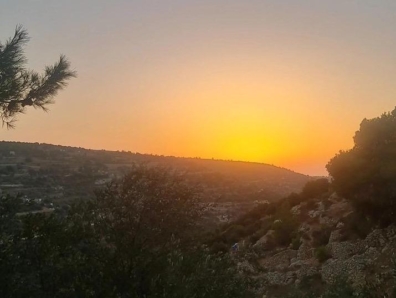「私たちを忘れないで」〜パレスチナに光を当てて〜 / D4Pメディア発信者集中講座2023課題作品 朝倉凜花
date2023.10.5
categoryD4Pメディア発信者集中講座2023
「私たちを忘れないで」〜パレスチナに光を当てて〜
2021年の8月。私はパレスチナ自治区(以下パレスチナ)の13歳から17歳の子どもたちとオンラインで話をした。2年前のことだが、何を聞き、何を感じたかを今も鮮明に覚えている。それほどその日パレスチナの子どもたちから発せられた内容は私にとって衝撃的なものだった。本記事では子どもたちの言葉、そして2年ぶりにオンライン上での再会を果たしたDefense for Children in Palestineの元職員Yazanさんの取材を通して、パレスチナの今を考えたい。
パレスチナは独立国家ではなく、パレスチナ自治政府が統治するヨルダン川西岸地区と、イスラム組織ハマスが実効支配するガザ地区に分断されている。パレスチナは歴史に翻弄され続けてきた。現在はヨルダン川西岸地区ではイスラエルによる入植が進み、ガザ地区では2007年以来イスラエル軍包囲により人や物資の移動が厳しく制限されている。このように、パレスチナはイスラエルの占領下にあるが、入植は国際法上違法だ。
図:パレスチナ自治区地図

出典:パレスチナ子どものキャンペーン
私は小学校高学年の時に映画「世界の果ての通学路」で山道やサバンナなどの危険だらけの通学路を毎日数時間かけて往復する子どもたちの姿を観て、自分の日常が当たり前ではないことに気づいた。大学入学後は子どもの人権について勉強したいとの思いで国際NGOでユースとして活動を始め、次第に緊急時(※1)の子どもの教育に関心を持つようになった。国際機関、NGOが出すレポートを読み、戦禍で暮らす子どもたちのことを理解したつもりになっていた。しかし、子どもたちが伝えてくれる想像を絶する事実の数々に痛みを覚えた。今までなんとなく遠かった問題が急に現実のものとして自分の前に現れたのだ。
(※1)緊急時とは、「深刻に紛争や災害、政治・社会的不安定に影響されている」(シンクレア, 2014, p.7)状態を指す。
突きつけられた現実
通学路でイスラエル軍から催涙弾を向けられること、複数の検問所でイスラエル兵士から暴力を受けること、校舎がたびたび軍事利用されたり、空爆により破壊されること…。子どもたちの言葉の一言一言から「教育は大事だ」と簡単に言えない現地の状況の複雑さに気づかされた。
2年前、子どもたちと話す3ヶ月前の5月10日には、イスラエルとパレスチナ自治区ガザ地区の間で衝突が勃発し、ガザにある31校の学校が空爆を受けていた。現在も未だ政情不安定な状態が続いており、軍事衝突のニュースを目にする。7月3日のヨルダン川西岸地区ジェニンの難民キャンプへのイスラエル軍の攻撃は記憶に新しい。あの子どもたちは今何をしているのだろうか…。
数日前私のインスタグラムのストーリーにYazanと表示された。2年前にパレスチナの子どもたちと繋いでくださったDefense for Children in Palestineの元職員のYazanさんだった。ダンスの舞台の写真があがっていて、思わず私は「あの時のRikaです。覚えていますか。今何をしているのですか?」とメッセージを送った。するとすぐに「もちろん覚えているよ」と返信をくれた。わたしたちはお互いの近況話に花を咲かせた。会話を続ける中で、電話を了承してくれ、今のパレスチナの状況や彼の考えを話してくれた。
物事は進み続け、私たちも生き続ける
朝倉:Yazanさんのインスタグラムの写真を見ました。とても賑わっている様子でしたね。何があったのですか?
Yazan:パレスチナの文化祭がありました。伝統的な踊りや音楽が披露されました。

文化祭の写真(Yazanさん撮影)
朝倉:投稿には写真と共に「私たちは、この国で起こっているあらゆるネガティブなことに主観的でなければならない。しかし、ポジティブなことに光を当てることも私たちの責任だ。」という言葉が添えられていました。どのような想いが背後にあるのでしょうか。
Yazan:人はネガティブな面に目を向けがちですが、同時に他にも目を向けるべき点がたくさんあります。すべてが良い/悪いと言うのは違うと思います。
ー 状況が厳しい中でも、他の側面にもちゃんと目を向けることを忘れないYazanさんに再び私ははっとさせられた。前回お話した際、困難な状況であってもパレスチナには一生懸命に日々を暮らしている人々がいて、素敵な文化があることをYazanさんは教えてくれた。「あなたはパレスチナに対してどんな印象を持っていますか」と聞かれた時、戦禍のイメージしか思い浮かぶことができなかった自分を思い出していた。ー
朝倉:Yazanさんは日本の人々にパレスチナのどんなところを知って欲しいと思いますか。
Yazan:まず皆さんに知ってほしいのは、パレスチナで人々が正義を求めていることです。なぜならパレスチナでは残念ながら不正義が起こっているためです。しかし同時に、美しい文化、芸術、遺跡などが多くあることも知って欲しいです。もちろんパレスチナの人々は苦労しています。生活は楽ではありません。でもだからこそ私たちには自身のウェルビーイングのために少なくとも前向きになれる何かが必要なのです。物事は進み続けるし、私たちも生き続けなくてはなりません。
今も危険な通学路
朝倉:以前子どもたちと話した際、通学路で催涙弾を向けられたり、検問所で暴力を受けることがあると聞きました。今もその状況は続いていますか。
Yazan:はい。残念ながら続いており、場所によっては悪化しています。
朝倉:そのような出来事はニュースになりますか。パレスチナの人々は自らの置かれた状況をどのように理解しているのでしょうか。
Yazan:メディアではあまり取り上げられません。でもパレスチナの人々はこのようなことが起きていることを皆知っています。むしろ重要なのは、国際社会に知ってもらうことです。これこそが変化を起こす方法なのです。変化はすぐには起こらないかもしれないし、私が生きている間には起こらないかもしれない。でも私は人々を信じます。少なくとも私たちは声をあげていく必要があるのです。そして、私はいつもこのように言っています、「私はこうして話すことはできるけど、現場に来て、見てみないと実際にどうなっているのかはわからない」と。パレスチナに来て初めて状況が見えてくるのです。だから多くの人にパレスチナを訪れてほしいし、そうすることで人々の意識も高まっていくと思います。

パレスチナの夕焼け(Yazanさん撮影)
選択の自由こそ、最も重要なもの
朝倉:Yazanさんには二人のお子さんがいらっしゃいますね。今後パレスチナがどんな社会になって欲しいと思いますか。
Yazan:これはとても難しい質問です。社会をコントロールすることはできないかもしれないけれど、私は彼女たちに、何が真実で何が正義なのかを大切にし、声を上げる強い女性に育ってほしいと思います。そして、私は彼女たちをサポートし、必要なことがあればどのようなときも一緒に戦うつもりです。私は全ての社会を変えることはできないけれど、私の住む地域を変えることはできます。そこに暮らす一人一人が自分の意思で決断を下し、自由な選択をしてほしいです。間違った選択をすることもあるかもしれません。でも大事なことは、その選択に責任を持つことです。なぜならその選択が間違っているか正しいかは、その人の主観的なものだから。私たちは占領されており、自由ではありません。だからこそ、選択の自由があることが最も重要であると私は思っていますし、このことを娘たちにも知っていてほしいです。
2年の時を経てまたこうしてYazanさんと対話をできたことに感謝したい。そして、周りの環境や状況が変わらない、むしろ悪化しているかもしれない中でも、Yazanさんの言葉の節々から2年前と変わらない、いやより強い想いや決意を感じた。時は過ぎる。でも、問題は過ぎ去らない。話を聞いた私は、2年前と同様に日々を強く生きるYazanさんに勇気づけられ、逆に自分をもどかしく思う。
2年前に女の子が繰り返し発した言葉が私の耳にいつもこだまする。
「パレスチナにいる私たちを世界中の子どもたちと同じように扱ってほしい」
問題は長期化すると光が当たらなくなってしまう。彼女の言葉には世界に見捨てられ続けた故への諦めの想いも含まれていたように思う。
ただ、彼女は「日本で私たちのことを伝えて」と続けた。私はこの時、彼女のような子どもたちを置き去りにせず共に行動し、少しでも多くの人々に伝えることこそが自分の使命だと感じた。対話の中で感じた痛みは今私の原動力となり、リマインドする思いで子どもたち、同世代の若者、政党省庁関係者などにパレスチナの状況を伝え続けている。そんな私の一歩から、関心の輪が少しずつ広がり、パレスチナの人々と連帯する人が増えていってほしいと願う。
参考文献:
パレスチナ子どものキャンペーン. [https://ccp-ngo.jp/palestine/palestine-information/]
(2023年9月3日にアクセス).
Sinclair, M., & 小松, 太郎. (2014). 紛争・災害後の教育支援. 東信堂.
「私たちを忘れないで」〜パレスチナに光を当てて〜
私自身パレスチナの子どもたちと話した時、心を大きく突き動かされました。パレスチナの状況をもっと知りたい、子どもたちに連帯を示して共に歩みたいと強く思うようになりました。日々刻々と世界情勢が変化する中で、パレスチナに光が当たっていないと感じます。Yazanさんへのインタビューや私の言葉が、少しでもパレスチナやその地で生きる人々に思いを巡らすきっかけとなれば嬉しく思います。
▶︎表現形式:文章
▶︎想定される受け手:日本語または英語を使う同世代の若者
▶︎制作:朝倉凜花
“Don’t Forget Us” – Shedding Light on Palestine
In August 2021, I spoke online with 13 to 17-year-old children from Palestine. It was two years ago, but I still vividly remember what I heard and felt. That is how shocking it was to hear what they expressed that day. In this article, I would like you to think about Palestine today through the children’s words and through an interview with Yazan, a former Defense for Children employee in Palestine, who has reunited with me online for the first time in two years.
Palestine is not an independent state, and is divided into the West Bank, ruled by the Palestinian Authority, and the Gaza Strip, controlled by the militant Islamist group Hamas. Palestine has been at the mercy of history. Currently, Israeli settlement continues in the West Bank, while the movement of people and goods is severely restricted in the Gaza Strip due to the Israeli military siege since 2007. Palestine is under Israeli occupation, but it is important to remember that settlement is illegal under international law.
Figure: Map of Palestinian Territory

Source: Campaign for the children of Palestine (CCP Japan)
When I was in the upper grades of elementary school, I watched the movie “On the Way to School,” in which children spent several hours every day traveling to and from school on mountain roads and savannas full of danger, and realized that my daily life was not the norm. After starting college, I wanted to study children’s rights, so I began working as a youth for an international NGO, and gradually became interested in children’s education in emergency situations. I had read reports published by international organizations and NGOs and thought I understood children living in emergency situations. However, I feel pain at the unimaginable facts that the children conveyed to me. Issues that had been somewhat distant suddenly appeared to me as a reality.
The reality confronting me
Tear gas fired by the Israeli military on the way to school, violence by Israeli soldiers at multiple checkpoints, school buildings frequently used for military purposes or destroyed by air strikes… Every word the children said made me realize the complexity of the situation in the region, where it is not easy to say, “Education is important.”
Two years ago, on May 10, three months before I spoke with the children, conflict broke out between Israel and the Palestinian Authority’s Gaza Strip, and 31 schools in Gaza were bombed. The political situation is still unstable, and I see news of military clashes. The July 3 Israeli military attack on a refugee camp in the West Bank city of Jenin is new to the memory. I wonder what the children are doing now.
A few days ago, my Instagram showed the stories of Yazan, a former Defense for Children in Palestine employee, who connected me with Palestinian children two years ago. I saw a picture of what looked like a Palestinian cultural festival, and I couldn’t help but say, “This is Rika from that time. Do you remember me? What are you doing now?” I sent a message to him. He immediately replied, “Of course, I remember you,” and we talked about what we had been up to. As we continued our conversation, he agreed to call and share with me the current situation in Palestine and his thoughts.
“Things keep going, and we need to keep living”
Rika: I saw your Instagram post. It looked very lively. What did you have yesterday?
Yazan: It’s the Palestine Cultural Festival. It featured traditional Palestinian dance and music.

Photo from the festival taken by Yazan
Rika: You wrote, besides photos, “We have to be subjective in light of everything negative happening in the country. But it is also our responsibility to shed light on the positive things in Bethlehem.” What were the thoughts behind this?
Yazan: Bet Lahem Live Festival featured traditional Palestinian dance and music. People often look at the negative side, but at the same time, there are many things that people should look at. I think it’s not fair to say everything is good or bad.
ー I was again struck by Yazan’s determination to look at different aspects of the circumstances despite the harshness of the situation. I remembered that the last time I spoke to him, he told me that even in difficult circumstances, there are people who are trying their best to live day by day and that Palestine has a wonderful culture. However, at that time, when I was asked, “What impression do you have of Palestine?” I could only think of the image of conflicts.ー
Rika: What do you want people in Japan to know about Palestine?
Yazan: First, I want you all to know that the people want justice because, unfortunately, injustice is happening in Palestine. But at the same time, I want you to know that there are a lot of beautiful culture, art, and historical remains. Of course, the people in Palestine are struggling. Their lives are not easy. But that is why we need at least something positive for our wellbeing. Things keep going, and we need to keep living.
Still, a dangerous way to get to school
Rika: When I spoke with children, I heard that they are sometimes subjected to tear gas on the way to school or violence at checkpoints. Is this still the case today?
Yazan: Yes. Unfortunately, it continues, and in some places, it is getting worse.
Rika: Do such events appear in the news? How do people in Palestine understand their situation?
Yazan: It does not get much coverage in the media. But the Palestinian people know that this is happening. What is rather important is to let the international community know. And this is the way to make change happen. Change may not happen right away, and it may not happen in my lifetime. But I believe in people. We need to speak up, at least.
And I always say this, “I can talk like this, but you will not feel the situation until you come and see how it is actually on the ground.” When you come, you really see the situation. So that’s why I always say that it’s very important for people to come and see. This is how the awareness is raised more.

Sunset in Palestine taken by Yazan
Freedom of choice is the most important thing.
Rika: You have two children. What kind of society do you want Palestine to be in the future?
Yazan: This is a very difficult question. I can’t control society, but I want them to grow up as strong women who care about what is true and just and speak up for it. I will support them and fight with them whenever they need me. I can’t change every society, but I can change my community. I want each one of the people to make their own decisions and make free choices. There may be times when they make a wrong choice. But the important thing is to take responsibility for that choice. Because whether that choice is wrong or right is subjective to the person. We are occupied and not free. That is why I believe it is most important to have freedom of choice, and I want my children to know this.
I would like to thank Yazan for the opportunity to have this conversation after two years. Even though the environment and circumstances around him have not changed and may have worsened, from every word he said, I sensed thoughts and determination that were the same, or even stronger, than those of two years ago. Time passes. But problems do not pass away. Listening to Yazan’s story, I was encouraged by the fact that he lives each day as strongly as he did two years ago, and conversely, I felt frustrated with myself.
I will never forget what one girl said repeatedly during a dialogue two years ago: “I want people to treat us in Palestine the same way they treat all the children in the world.” The longer a problem is prolonged, the less light it sheds. Her words seemed to include a sense of resignation at the world’s continued abandonment of Palestine.
However, she continued, “Tell people about us in Japan.” At that moment, I realized that my mission was to act together with children and tell as many people as possible about them without leaving them behind. The pain I felt during the dialogue has become my driving force, and I continue to tell younger children, people of the same generation, and people involved in political parties and ministries to remind the situation in Palestine. From such a step, I hope the circle of interest will gradually expand, and more people will stand in solidarity with the Palestinian people.
Title: “Don’t Forget Us” – Shedding Light on Palestine
Form of expression: Text
Intended audience: People who use Japanese or English and are within reach through my SNS and spreading.
Intention: I myself was greatly shocked when I spoke with Palestinian children, and this made me want to know more about the situation in Palestine and to show solidarity with the children. As the world situation changes day by day, I feel that Palestine is being forgotten, and I would be happy if my interview with Yazan and my words could help people think about Palestine and the people living there.
-
- こちらは、D4Pメディア発信者集中講座2023の参加者課題作品です。全国各地から参加した若者世代(18~25歳)に講座の締めくくりとして、自身の気になるテーマについて、それを他者に伝える作品を提出していただきました。


